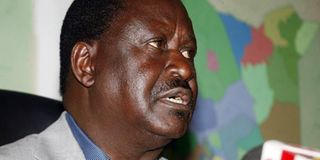Raila Odinga says poverty is a threat to stability of African countries

Cord leader Raila Odinga address journalists at Capitol Hill Square in Nairobi on July 23, 2014. PHOTO | EVANS HABIL
What you need to know:
- Without attention to the issue of equity, growth will continue being mistaken for progress and Africa’s journey to the future shall remain uncertain.
- Change is taking place at a dizzying pace all over Africa.
NEW HAVEN, USA
Statistics showing high rates of economic growth in Africa are misleading unless they include measurements of how that growth is distributed within a society, Cord leader Raila Odinga said in the US on Thursday.
Mr Odinga said Africa has some of the most unequal societies in the world.
“We must begin paying attention to people struggling at the bottom of the ladder. Inequality and lack of opportunities for those at the bottom threatens the future of everyone and can actually bring down nations.
“Without attention to the issue of equity, growth will continue being mistaken for progress and Africa’s journey to the future shall remain uncertain,” he said in a speech at Yale University.
Mr Odinga's 45-minute address was entitled “Afro-Optimism: Has the Pendulum Swung Too Far?”
HIV INFECTIONS
Mr Odinga pointed out that there has been a decline in malaria deaths, HIV infection rates and child mortality.
He said life expectancy is increasing, real incomes rising and democratic elections are becoming the norm in the continent.
“Despite persistence of the old habits and old troubles, hope is everywhere. Change is taking place at a dizzying pace all over Africa,” he said.
He said Kenya is a technologically advanced country citing its creation of the M-Pesa mobile money transfer system and the fact that “mobile-phone penetration stands at 80 per cent for people over 15.”
“But challenges remain. We have not invested enough in value addition so we can stop exporting raw products like coffee, oil and iron ore. Africa should be sending petro-chemicals abroad, not just oil.
“We have not done enough to rein in the cancers of corruption, tribalism, nepotism and patronage,” he said.




